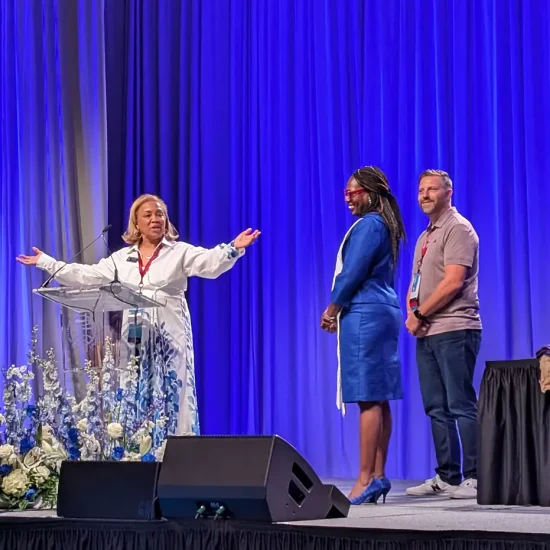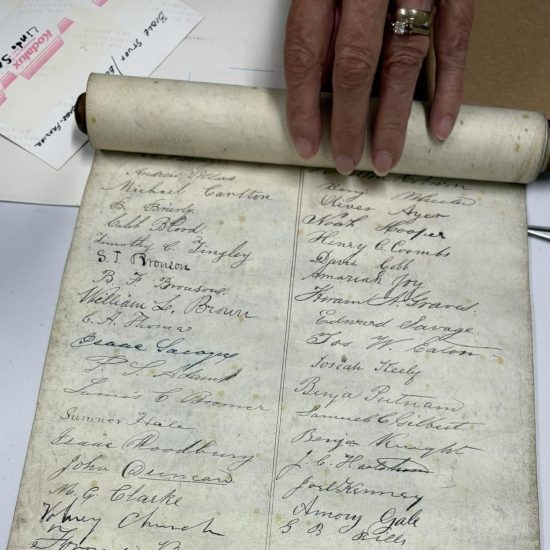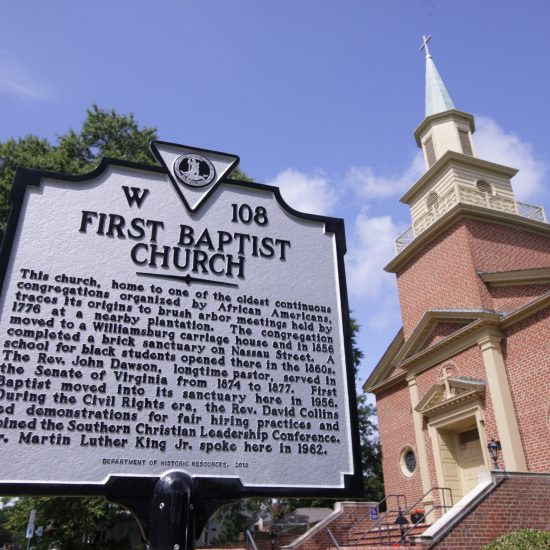

THE WORD MADE FRESH: Preaching God’s Love for Everybody. By George A. Mason. Edited by Ann Bell Worley, Gail S. Brookshire, Jack Hall, Julie Merritt Lee. Canton, MI: Front Edge Press, 2023. Xxv + 401 pages.
All Baptists are not alike, which is a good thing since there are a lot of Baptists out there. There are conservative Baptists, such as the ones we find affiliated with the Southern Baptist Convention, which calls for women to submit to men in authority and recently moved to expel all member churches that have women pastors, whether they’re lead pastors or not. There are Baptists who are committed to taking dominion over the government, which is odd since the earliest Baptists in what is the United States, people like Roger Williams and John Leland argued for a full separation of church and state. There are other Baptists, who are more moderate or even progressive. They support the role of women in ministry and adhere to the principles espoused by Williams and Leland. One who fits this latter category is George A. Mason, the recently retired pastor of Dallas’ Wilshire Baptist Church (it’s affiliated with the Cooperative Baptist Fellowship, not with the SBC!).
The book under review, The Word Made Fresh offers us a collection of sermons preached during Mason’s thirty-year ministry at Wilshire Baptist Church in Dallas, Texas. The collection, as published, was put together by a set of editors who wanted to present the collection to Mason on his retirement as a testament to his many years of faithful service to the church he served, and the broader church, service that is captured in his many sermons. This set of sermons offers us a more progressive Baptist vision, one that might resonate with folks who are not Baptist (people like me, though I spent time among the Baptists through the years).
Before I get to the collection itself, I would like to share a bit about Mason for those who might not know him (people like me who did not know about Mason before I read the book). Mason is Senior Minister Emeritus of Wilshire Baptist Church (Cooperative Baptist Fellowship) and the Founder and President of Faith Commons. Faith Commons is an interfaith nonprofit organization that amplifies diverse faith voices for the common good. Over the years Mason has contributed to the op-ed page of The Dallas Morning News, is a co-founder of the Cooperative Baptist Fellowship, and teaches at Perkins School of Theology (Southern Methodist University).
Sermon collections were once very common. Well-known preachers such as Harry Emerson Fosdick and Edgar DeWitt Jones (my predecessor several generations in the past at Central Woodward Christian Church) published collections of their sermons. They were once considered attractive devotional books (and might also serve as helpful fodder to overloaded preachers looking for some good ideas. That is less true today, in large part because sermons are so localized. So, if sermons are published, they are, as in the case of several of my books, repackaged to speak to a larger, more generalized audience.
This collection will be most attractive to Mason’s fellow Baptists, especially those who are part of the Cooperative Baptist Fellowship. He is an important figure in that movement but whether he is known outside that circle or Dallas is not known (at least I had never encountered him before receiving a review copy from the publisher. Nevertheless, even if Mason is not well known outside Baptist circles, he does offer readers a vision of Christian faith that is deeply rooted in Scripture and Christian tradition. It is also open to new currents present in the world, including the full inclusion of LGBTQ folks in the church (you can imagine how conservative Baptists, who struggle with the idea that women might be called to preach would look at LGBTQ inclusion). In fact, several sermons address the difficult decision of his congregation to make the church fully inclusive. Interestingly, that vote coincided with the very divisive 2016 elections.
The editors of the volume, who hail from the congregation, note in their preface that “at its best, preaching delivers a prophetic word to a congregation at a specific place and time, taking into account not only the scriptural passage at hand but also current events in the local community, the nation, and the world” (p. xv). There is much truth in that assessment. Therefore, this volume could easily serve newly ordained clergy or seminary students as a source of exemplary sermons (if any choose to preach the sermons as is, they will be well-advised to make that clear to the hearers).
The editors have divided this collection of sermons into twelve parts (the book is nearly 400 pages in length so that division makes sense). Each section is introduced by a friend and colleague. The sermons cover all matters of theology, Christian formation, mission, Christian civility, calling to ministry in its various forms, pastoral care, stewardship (for those who, like me, have never enjoyed stewardship sermons, it’s clear that Mason isn’t afraid to talk about money), the Free Church roots of the Baptist tradition, ecumenism, interfaith relationships (I should note that while Mason is open to dialogue and friendship, he also stands firm in his Christian faith), peacemaking and nonviolence, and how faith might be present in the public square. Regarding that final emphasis, when one gets to Part Eleven, which focuses on bearing witness in the public square, he addresses marriage equality, the capitol insurrection, and the invasion of Ukraine. In these sermons, we see examples of how one might take up difficult topics and address them directly even if not everyone in the congregation is on the same page. When we get to Part 12, we encounter what can be difficult sermons since their farewell sermons. Mason’s final two sermons are included in the collection. As one who has said goodbye to a congregation and entered retirement, I can testify that these sermons are often difficult to deliver. Nevertheless, they are important discourses as they can speak not only to the past but offer words of hope for the future of the congregation that one has served faithfully for a long time. That is what Mason does. So, his final words are these: “Do not be afraid. Fear Not. Take courage. God is with you, carrying you on as you carry one” (p. 395).
The final sermon isn’t the last word from George Mason. The editors allowed him to write an Afterword. He tells the reader that he hopes it gives hope to all who read the sermons in the book. Noting Martin Luther King’s dictum that the moral arc of the universe might be long, but it bends toward justice (despite what we might currently be seeing going on in society). With that in mind, he reminds us that God prefers to work with us than without us. Thus, “we are in the bending business with God, . . . hastening the day when all shall be well. We do that through word and deed. The performative language of preaching combines the two as it brings new realities into being through speech” (p. 396). That is a good word for preachers and non-preachers to hear.
One doesn’t generally sit down and read a sermon collection from cover to cover, word by word. Such collections require time to ponder and contemplate the word. Sermons, especially sermons preached over more than three decades of ministry will speak to people differently. Thus, one might skip around, taking in specific words that speak at a particular time and place. It can be used devotionally, even if not every sermon will speak in the same way. It is important to remember that these sermons are offered to the reader as they were preached. Therefore, they address people and situations in particular at that particular moment. Because of the particularity of sermons, some of what is presented by the editors won’t speak as directly to the reader as other sermons. That is because some of what is presented here speak in ways that transcend time and place. And as a preacher, I know that this is the way it should be. So, readers will find different pieces speaking to them, while others won’t. What I can say is that this collection offers us a vision of what can be said in the pulpit that represents to the larger world a positive/hopeful vision that is not naïve about the realities we face. One need not be a Baptist to benefit (though Baptists who know Mason will likely share a common set of understandings) from reading and contemplating the message recorded here (I’m a retired Disciples of Christ pastor so I share some of the background but not all of it). So may the Word we preach and hear truly be made fresh, such that the message of God’s love for everyone might be years.
This review originally appeared on BobCornwall.com.
Robert D. Cornwall is an ordained minister in the Christian Church (Disciples of Christ). Now retired from his ministry at Central Woodward Christian Church (Disciples of Christ) of Troy, Michigan, he serves as Minister-at-Large in Troy. He holds a Ph.D. in Historical Theology from Fuller Theological Seminary and is the author of numerous books including his latest “Second Thoughts about the Second Coming: Understanding the End Times, Our Future, and Christian Hope” coauthored with Ronald J. Allen. His blog Ponderings on a Faith Journey can be found at www.bobcornwall.com.






